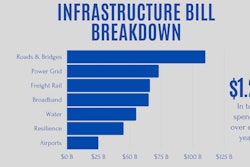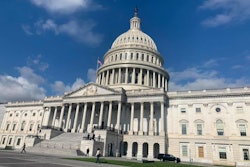
Bill Gates has been an ardent supporter of initiatives to tackle climate change and wants in on moving green infrastructure forward. Gates said last week that if the infrastructure bipartisan infrastructure bill moves forward, his climate investment fund, Breakthrough Energy, would match $1.5 billion in government funds and put that money toward projects that are developing green technologies.
The $1.5 billion will be used for public private partnerships or joint projects with the federal government to help fight climate change as part of proposed initiatives in the Senate’s $1.2 trillion infrastructure bill. The package includes $25 billion for the Department of Energy for public-private partnerships. If the bill becomes law, Breakthrough Energy can apply for matching funds. If the bill fails, Gates suggested his funds could go to other countries if the bill, which still faces a very uncertain fate in Congress, doesn’t end up getting passed.
Gates told the Wall Street Journal that the infrastructure bill’s $25 billion provision for climate-focused demonstration projects, which are small-scale projects used to “demonstrate” a technology's impact, are key to develop new technologies, test a project's viability and eventually drive down the market price of clean energy.
Breakthrough Energy tweeted that it wants to work with the Energy Department to spur up to $15 billion in investments in technologies that might be able to help the US bring its carbon dioxide emissions down to net-zero.
The Biden administration has pledged to get the US on track to reach net-zero greenhouse gas emissions by 2050. Leading climate scientists have found that hitting that target globally could prevent some of the worst effects of climate change.
Climate-Friendly Infrastructure Funding
By a vote of 69 to 30, including 19 Republicans and all 50 Democrats, the U.S. Senate passed the $1.2 trillion infrastructure package, known as the Infrastructure Investment and Jobs Act, on Tues., Aug. 10, 2021
Following passage, the proposed legislation was sent to the House of Representatives where further adjustments are expected. Should the bill pass, the House and Senate will need to consolidate their respective versions for a final bill to go to President Biden for his signature.
The 2,702-page bipartisan bill contains just $550 billion in new spending. The $1.2 trillion figure comes from including additional funding normally allocated each year for highways and other infrastructure projects. The new spending for "green initiatives" consists of:
- $110 billion for roads and bridges. In addition to construction and repair, the funding also helps pay for transportation research at universities, funding for Puerto Rico’s highways, and “congestion relief” in American cities.
- $65 billion for the power grid. The bill would fund updates to power lines and cables, as well as provide money to prevent hacking of the power grid. Clean energy funding is also included.
- $55 billion for water infrastructure. This funding includes $15 billion for lead pipe replacement, $10 billion for chemical clean-up, and money to provide clean drinking water in tribal communities.
- $47 billion for cybersecurity and climate change. The Resilience fund will protect infrastructure from cybersecurity attacks and address flooding, wildfires, coastal erosion, and droughts along with other extreme weather events.
- $21 billion for the environment. These monies would be used to clean up superfund and brownfield sites, abandoned mines and old oil and gas well
The package promises to fund some important climate programs, with sizable expenditures for cleaning up abandoned oil wells, replacing lead pipes and repairing roads and bridges. The $50 billion in climate resilience funding will protect people from the storms, droughts, floods and other extreme weather events made worse by climate change.




















